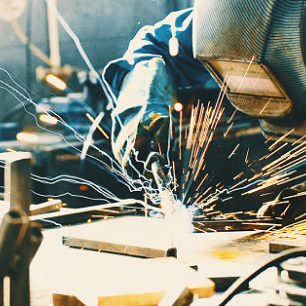Jump to:
Audits as Allies
Audit. A word that seemingly instills fear and panic in welding shops everywhere. Just uttering that word has probably raised the blood pressure of a quality manager or project manager somewhere. I admit that the thought of having someone else swoop in and check up on me didn’t always give me the warm fuzzies either.
I had a misconception that the purpose of an audit was to find what I was doing wrong. That misconception left me, like most, with an unfounded and irrational fear of being audited.
Several years (and countless audits) later, I came to appreciate those checkups from outside sources. I learned to walk into an audit with an open mind, heeding the advice and suggestions rather than being defensive and closed-minded.
Opportunity for Growth
If you allow it, an audit is an excellent opportunity for your operation to grow. It lets you showcase how effectively your current systems function. Audit findings can also allow you to improve and streamline your operations. It is easy to believe your current systems are flawless and your operation is as seamless as possible. I mean, you do this stuff every day, so why wouldn’t it be, right?
Sometimes we get so inundated with our daily operations that we can’t see the forest for the trees, as they say. This is where auditing, whether it be internal or third-party, can become our best friend.
Auditing brings in a fresh set of eyes and gives us a look from a different perspective. It allows our procedures and operations to be surveyed without bias.
Evaluate Efficiency
From a welding perspective, auditing offers insight into the efficiency and effectiveness of our process selection, filler metals, and postweld activities.
It’s no secret that welding isn’t cheap. Power sources, electrodes, filler metals, and abrasives are all expensive. And, of course, labor only adds to the costs. Audits present us with the opportunity to evaluate the efficiency of all these factors. For example, let’s say we are welding an out-of-position joint with short-circuit gas metal arc welding (GMAW) then sanding weld spatter off the adjacent base metal. This quickly becomes costly. We are paying to weld the joint, sand off spatter, and then adding in the cost of abrasives.
If we audit the procedures, switching to pulsed-spray GMAW welds the joint faster (producing a better bead profile), reduces spatter by up to 90%, and, theoretically, eliminates the need to use abrasives to remove the spatter. This change reduces the time and materials used to produce the same product.
Reducing time and materials keep money in our pocket, and that is with just one small change. If we audit more areas, we could find more areas for improvement. As someone who has been on both sides of audits, I can attest that the costs and time associated with auditing are easily recouped. As in our example, one minor but significant change can revamp an operation. I’ve seen several audit findings turn out to be the small change needed to keep a shop profitable.
Learning from Experience
Early in my self-employment, I was given an opportunity (via a former coworker) to audit a large repair shop for underground mining equipment. This was when the coal market was getting soft, Illinois Basin mines were closing, and repair facilities feared meeting a similar fate.
This shop was rebuilding coal shearer drums, replacing the bearing housings and welding up bit blocks with low-hydrogen shielded metal arc welding electrodes. As a self-employed welder, I had already faced the trials and tribulations of cutting costs to stay alive in the coal fields and had recently changed nearly all my welding operations to flux cored arc welding (FCAW). It was a no-brainer to change this shop to FCAW as well. We changed the process and watched the shop go from scraping by (under the ever-looming fear of layoffs) to holding steady in a plummeting market. Who knows how that would have turned out without a simple audit from an outside source?
On the opposite side of the coin, I remember another shop with a hardheaded foreman rebuilding earthmoving equipment. This shop was overworking three welders to keep up production while cutting costs. The owners brought in a consultant (a young kid who worked for the largest equipment manufacturer in North America. What could he know, right?) to audit the shop, and after less than two hours of watching us in action, he told us to hire two more guys. How could a shop on the verge of closure justify hiring two more welders? The owners took his advice and hired two more welders (whom I swore we couldn’t afford). Lo and behold, the kid was right. The workflow improved, employees were more productive because they weren’t being overworked, and shop availability increased, allowing more work to come in. In less than two hours, an outside auditor put fresh eyes on the operation, realized the bottleneck, and solved the issue. That shop would have closed in less than a month without the audit. That was the moment I changed my view on audits.
Since then, I have become a die-hard advocate of auditing, whether they are internal audits, audits by accrediting bodies, or outside audits by consultants. They are beneficial and nothing to fear.
Audit Recommendations
Audits and auditors help maximize an operation’s potential while minimizing waste. A successful audit doesn’t have to be extravagant. Simple, periodic reviews of an operation can be highly successful. I am a fan of a system comprising frequent internal reviews followed by an annual outside audit. I like to perform these internal reviews either monthly or quarterly, depending on the size of the operation. These are typically conducted in-house, which also helps keep costs down. Although they impose an increased cost, annual outside audits give you an unbiased look into the workings of your operation. They also offer unique insights and new points of view. An audit system of this type keeps operations efficient with frequent internal reviews while allowing an outside perspective at reasonable intervals.
For operations with quality systems already in place, allowing an outside consultant to perform a periodic audit can be an excellent method of keeping your quality system from getting stale. For smaller operations, I highly recommend setting up an audit system even if you don’t think you need it.
Conclusion
In the world of competitive bidding and lean manufacturing, efficiency is everything. Bringing people in to observe and evaluate is a good thing. I’ve learned over the years that no one knows everything and everyone knows something. Audits are opportunities, not obstacles. Use them to your advantage. There’s an old saying in the coal fields, “No matter how good you think you are, you can always be gooder.” Audits make us better.
CURT GREEN (curtis.green@kctcs.edu), an AWS SCWI, AWS CWE, and ASNT NDT Level III, is an associate professor of welding technology at West Kentucky Community & Technical College, Paducah, Ky., and owner of AccuWeld LLC, Golconda, Ill.


